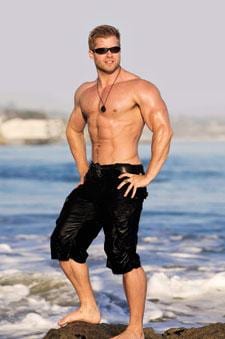When the DVD of an Englishman in New York hits stores, Blockbuster patrons in the small town of Harrow, Ontario (even the straight ones, who might otherwise be disinclined to rent this sequel to the 1975 Quentin Crisp biopic The Naked Civil Servant) will be watching for the scene in which a muscular bouncer ejects Crisp (John Hurt) from a late-1970s Manhattan leather bar. The bouncer is played by Craig Ramsay, an out Canadian actor and dancer who, like Crisp, left the strictures of his homeland behind to pursue fame and fortune in the US.
“Where I grew up, I didn’t know much about the world beyond it,” he says, laughing.
“I saw Miami Vice and Beverly Hills 90210,” he says, “but it never really occurred to me that those places were real.”
He played “lots of hockey” and competed in track and field, volleyball and badminton. Ramsay later trained with the Royal Winnipeg Ballet, after getting his start doing Anne of Green Gables at the Charlottetown Festival as a teenager.
By 2000, he was part of the original North American touring company of Mamma Mia.
“That year I was also a Sunshine Boy,” he adds wryly, “which embarrassed my grandmother more than me being naked in Hair.”
Mamma Mia took Ramsay to the US. When the tour ended, armed with his green card, he remained.
“I just kept auditioning and booking gig after gig,” he says, “and before I knew it, my career and life were established in the US.”
In the years since, he’s worked with Stephen Sondheim and Hal Prince in Bounce at Chicago’s Goodman Theater; played Boris in Fiddler on the Roof; and most recently played Rocky in the Universal Studios production of The Rocky Horror Picture Show. Off-Broadway audiences will remember his sexy turn as Alexander the Great in A Kiss From Alexander.
Ramsay was a visible protester at the demonstrations against Proposition 8 in California, the amendment banning gay marriage in that state. While recognizing that as a Canadian (albeit a green card–holding “alien of exceptionable ability,” in the colourful parlance of US immigration law) he had no vote, he felt it was important to make his voice heard.
To Ramsay, who came out to his parents early, it’s likewise important to be an out actor, adding, “I’m not going to be a good actor, or be able to help other people, if I’m not secure in my own life. That goes for my training, and it goes for what I communicate as an actor. It’s going to come from a place of reality if it’s real in me.”
“My first year in the US, I attended the Pride parade in San Francisco,” Ramsay says. He recalls being uncomfortable with some of the extremes he saw at the parade, wondering aloud how the display of so many stereotypes was advancing gay rights.
“Someone verbally slapped me across the face,” he says ruefully. “They told me, ‘This isn’t just about fighting for the rights of gay people who fit neatly into the straight world. The fact that you can pass as straight means that you need to have a much louder voice in this struggle.’”
The reprimand served as a clarion call to his activism.
“It’s important for queer people to come out, for the sake of gay youth. I can’t tell you how many gay kids have reached out to me for support through my website, on Facebook or at a performance, because they’re not getting it at home. When people don’t live their lives openly,” he says, “there’s no one to look up to.”

 Why you can trust Xtra
Why you can trust Xtra


